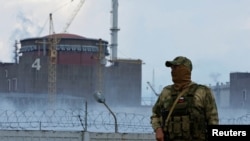Russian forces rebuffed a Friday night attempt by Ukraine to recapture the Zaporizhzhia nuclear power plant, Russia’s defense ministry said Saturday.
Russia’s defense ministry said a naval force made up of more than 250 Ukrainian troops tried to land on the coast of a lake near the plant Friday night. The attempt was called off after strikes from Russian military helicopters and fighter jets destroyed 20 Ukrainian vessels, the ministry said.
"Despite the presence of representatives of the International Atomic Energy Agency (IAEA) at the Zaporizhzhia nuclear power plant, the Kyiv regime once again attempted to seize the plant," the defense ministry said.
The plant was captured by Russia in March but is still operated by Ukrainian staff. The IAEA sent inspectors to the nuclear plant this week due to concerns that escalating violence could trigger a Chernobyl-style nuclear disaster.
Meanwhile, Kremlin-backed local authorities said the Zaporizhzhia plant, Europe’s largest nuclear generation site, had stopped supplying electricity to Ukrainian-held areas due to an alleged Ukrainian shelling attack Saturday morning that destroyed a key power line.
“The provision of electricity to the territories controlled by Ukraine has been suspended due to technical difficulties,” the municipal administration in Enerhodar, where the Zaporizhzhia plant is located, said in a post on its official Telegram channel.
Ukraine and Russia have blamed each other for shelling at and near the plant.
The IAEA said Saturday that the power plant had been disconnected from its last remaining main power line and is now relying on a reserve line. The three others were lost earlier in the fighting, the agency said.
"Ukraine's Zaporizhzhia Nuclear Power Plant (ZNPP) has once again lost the connection to its last remaining main external power line, but the facility is continuing to supply electricity to the grid through a reserve line, the International Atomic Energy Agency (IAEA) was informed at the site today," the agency said in a statement.
Nuclear inspectors
The IAEA inspectors who visited the Zaporizhzhia plant this week had to brave artillery blasts to reach the facility Thursday.
IAEA head Rafael Mariano Grossi said he and his team saw everything they asked to see at the plant, were not surprised by anything, and he will issue a report early next week on his findings.
A team of 13 experts accompanied Grossi to Ukraine, and he said six have remained at Zaporizhzhia. Of those six, two will remain until hostilities cease, which Grossi said would make a huge difference.
"If something happens or if any limitation comes, they are going to be reporting it – report it to us," Grossi told reporters Friday. "It is no longer a matter of 'A said this, and B said the contrary.' Now the IAEA is there."
Energy battle
As an energy battle between Russia and the West over the war in Ukraine intensifies, a top EU leader said Saturday that Europe is “well prepared” if Russia decides to stop all gas deliveries.
"We are well prepared to resist Russia's extreme use of the gas weapon," EU Economy Commissioner Paolo Gentiloni told reporters on the sidelines of an economic forum in Italy. "We are not afraid of [Russian President Vladimir] Putin's decisions, we are asking the Russians to respect contracts, but if they don't, we are ready to react.”
Gentiloni’s remarks came on the heels of Moscow’s decision Friday to delay the reopening of its main gas pipeline to Germany. Russia was reacting to the Group of Seven countries’ agreement to cap the price of Russian oil exports, limiting Moscow’s profits.
Gentiloni said that gas storage in the European Union "is currently at about 80%, thanks to the diversification of supplies," although the situation varies in each country.
Russian energy giant Gazprom said it could not resume the supply of natural gas to Germany, just hours before it was set to restart deliveries through the Nord Stream 1 pipeline. Russia blamed a technical fault in the pipeline for the move.
Margaret Besheer contributed to this report. Some information came from The Associated Press, Agence France-Presse and Reuters.





